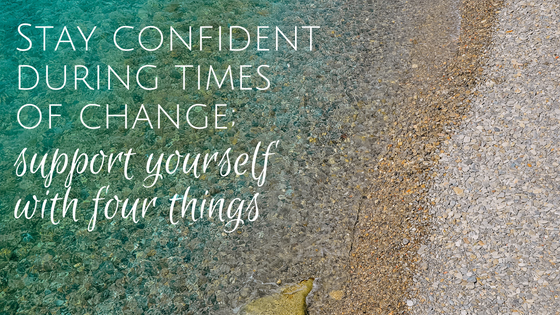Stay confident during times of change; support yourself with four things
/When we are looking to make a change in our career or life, we need support.
Many of my career coaching clients work with me because they want to change roles, or completely change their careers. Sometimes, this means shifting industries, sometimes it means moving away from paid employment. Other times it is starting their own business, re-training or choosing to embrace a different employment model or method.
Sometimes, clients want assistance and support as they make significant changes in their personal life, such as during or after downsizing or relocating, or even completely re-evaluating and shifting the life they live.
Whilst working with a career and life coach (that’s me!) is excellent support through all forms of transition, there are a few things we all need to feel calm and confident when moving through a time of change.
(A note on transitions – life is full of transitions, from the moment we are born right through to our end of days, there are hundreds of transition moments we experience. I have written extensively about transitions, and you can read more about them here)
Seek additional support
Family and Friends can be valuable Support during times of change
During times of transition and change, a strong support system is important. Your family, loved ones, friends and colleagues may all be great sources of encouragement and support. If they are, that’s great! Make the most of their love and support.
But, equally, those closest to you might not be the best source of support. If they are also experiencing a significant change, feel worried about the change you are making, or are moving through the change with you (for example, your partner and children if you are downsizing the family home), they can require support and not be in a position to provide it.
Depending on the nature and type of change you are experiencing, joining a networking group or professional association to connect with others who are going through a similar transition can assist. Additionally, the support and help of a qualified professional (like me) can also provide added guidance to move through the change with confidence.
Here is the good news. There is also a way YOU can support YOURSELF during times of change. I’ve been using this approach for a few years now with my clients and personally, and share it here as it is transformative. A simple approach with big benefits.
Identify your anchors or the four things
I read about this idea in Cait Flanders’ book, ‘Adventures in Opting Out; A Field Guide to Leading an Intentional Life’.
In the book, Cait says that before making a significant change (in her case, moving to the other side of the world to travel long-term) she identified four things that made up the majority of her routine, so she could aim to recreate them in any location she travelled.
For Cait, as well as a home base, she identified she also required walking distance access to;
a coffee shop which was also suitable to use for writing,
a grocery store,
a trail to walk or hike, plus
access to something big in the wild that gave her perspective (such as a mountain or body of water).
I immediately loved this idea and realised the four-thing approach had relevance and pertinence for all of us, regardless of what type of transition we are experiencing.
In order for this approach to work best, it comes down to a couple of key questions that tap into our self-awareness;
When am I at my best?
And therefore, what daily habits support me with that?
When sharing this approach with my clients, some have achieved a similar outcome by asking a slightly different question;
What daily habits help me be my best self?
Or, as I often refer to them, what daily anchors help support me?
Having nurturing daily habits or anchors during times of change helps us feel grounded, and calmer. Which in turn helps support us to feel confident in what can otherwise be a challenging, even tumultuous, period of our lives.
Simple is key
10 minutes of Yoga each morning is one of my Foundational Four things
Anchors can be very simple, just as our 4 things can be very simple.
For example, I know that regardless of where I am, my foundational anchors or four things remain fairly similar. I also know by adhering to my anchors (having identified what they are and prioritised them), I am better able to cope with whatever life is giving me at that moment. Whether it be a positive change or an unwanted change.
The simplest of anchors, or my current four things, are;
A walk in nature,
10 minutes of meditation,
10 minutes of yoga and
Completing my gratitude journal in the evening.
These are my foundations for daily support. In times of more substantial change, I may require additional things or activities to support me feel grounded, calm and confident to move through the change. The additional items will vary based on the change I am experiencing.
Examples of anchors or four things
When leaving a Loved one or Pet, we think about what makes them feel safe and comfortable.
Many of us struggle to prioritise ourselves, even when we are going through a major change. So, here is another example to illustrate this idea further, which may be easier to relate to, as it involves caring for others.
If you are a parent or have cared for another living creature (human or animal), cast your mind back to when you left your child, loved one or pet with someone else overnight for the first time. (If you’ve not ever done this, use your imagination)
What key items would you ensure they had to ease their experience? It might be their usual pyjamas, bed or bedding so it smells familiar, their favourite food or treats, a favourite soft toy for comfort and some essential items for peace of mind (yours, as well as theirs). We do this to help make the experience less stressful for our loved ones, as well as easier for those tasked with caring for them.
Here are a few examples that relate to the experience my clients have, to illustrate what this might look like for adults when experiencing major life changes.
Career change
If a client is looking at shifting roles but staying within the same industry, their four things, in addition to the new job, might be;
A flexible working arrangement,
An easy commute,
Being based in a familiar location, and
A friend who works nearby to meet for lunch.
These four things would contribute to ensuring the transition is easier and less stressful, as they provide space (flexible working and an easy commute) to lean into learning the new role, without being exhausted by needing to learn a new neighbourhood (familiar location) and with the added support of knowing a friend is nearby for connection.
access to mentoring or a peer or friend can help
Alternatively, if a client is looking at changing industries or starting their own business, their four things, in addition to the new role, might be;
Peer or friend who has done the same
Access to a learning and/or development program,
A mentor, and
A Flexible working arrangement.
In this scenario, these four things would support a significant life transition to be less overwhelming. These four things ensure there is someone who has a little more experience to talk (peer or friend), supported opportunities to learn and grow in the new industry or business (access to learning and development), guidance and support from a more experienced professional (mentor) and the time and space to embrace the new opportunities and integrate learnings (flexible working arrangement).
Lifestyle changes
Access to Open space for recreation is often one of the four things for many lifestyle changes
A client wishing to change their home life, such as relocating or downsizing, would likely have very different anchors to ensure an easy transition. For those people, in addition to finding their new home, the four things or anchors could be, for example;
A friend or family member living nearby
A walkable location (i.e. short walk to cafes, restaurants and/or local stores)
Proximity to open public space for recreation, and
Good community facilities for their stage of life.
In this scenario, a daunting significant change is less scary when connection is available (friend or family nearby), the new home, suburb or town feels liveable (walkable and proximity to space for recreation) and other support features are in place (community facilities for their stage of life). Thinking about the relevant stage of life is a big area for potential support. For example, clients who move from a small apartment to the suburbs for their family may prioritise playgrounds and good schools. Alternatively, clients who are considering downsizing as empty-nesters or are starting to think about easing back on work commitments may prioritise cafes, public transport links and access to art galleries, museums or theatres. Others still may want to be close to the beach or ensure good medical services are nearby.
As you can see from these examples, anchors or the four things are personal and specific. What works for me may not work for you. And what worked for you and your career change last year, may not support you next time. Equally, the four things when changing your career are unlikely to be relevant if you are making a lifestyle change. That is the beauty of this approach; it’s perfectly tailored and customised to support YOU as you move through the current change you are experiencing.
Anchors matter
The idea of identifying your four things, or your anchors is a form of radical self-care. After all, self-care is doing what you need to stay grounded in your body and be emotionally well. And when we are experiencing a major change in life, whether it be in our career, living arrangements or other forms of change, we need to tend to our emotional health just as much as our physical health.
Anchors, or your four things, support you to do this. By gaining clarity about what is important and necessary, and simplifying your requirements to what is essential for YOU, you move through a period of transition with greater calm and confidence. The transition will still be challenging, but hopefully, less overwhelming. With a few key anchors, routines or habits in place, you may even find yourself moving through the transition more quickly, and feeling settled and confident faster than you thought.
When you need more
Identifying your four things is great support, but sometimes we need a more specific, tailored approach to increase our clarity and confidence and enhance our feeling of calm during times of transition. And that’s where working with a coach (that’s me!) comes in. With one-on-one individual support, coaching can make all the difference when you are either thinking about or experiencing a time of change or wanting to feel clear and confident in your career, business, and life.
A confidence package, which includes 6 individual coaching sessions starts with a complimentary consult where together we can determine if coaching with me is right for you. Get started today – simply book your call.
















